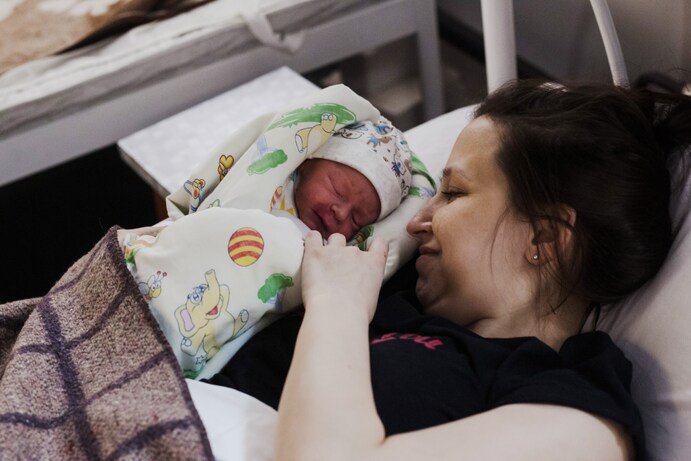Ukrainian women are at higher risk now for unintended pregnancies

Unintended pregnancies will likely be one consequence of Russia's invasion
One potential lasting consequence of the Russian invasion for Ukraine is more unintended pregnancies, which could have ripple effects for years to come.
Just look at estimates for Afghanistan. A new United Nations report estimates that the Afghanistan war may lead to 4.8 million unintended pregnancies by 2025 — an effect that could also show up among Ukrainian women and girls who are being uprooted from their homes.When Russia first invaded Ukraine, officials involved in relief efforts said their priority was to deliver lifesaving trauma supplies to hospitals to stave off immediate deaths.
But now Ukraine’s health system is under tremendous stress as it struggles to meet the needs of almost 6.5 million people displaced within its borders, more than half of whom are women, according to a study by the International Organization for Migration. Five weeks into the war, relief workers are scrambling to meet ongoing health needs — and for women, that includes reproductive health care.
“When we are in the center of this, of course the first thought is how to survive,” Halyna Skipalska, director of Ukraine for HealthRight International, told The Health 202. “Two weeks ago, reproductive health was not a main focus, but now [organizations of relief efforts] are thinking of it.”
The U.N. Population Fund (UNFPA), a sexual and reproductive health agency, estimates that at least 265,000 Ukrainian women were pregnant when the invasion began, and up to 1,000 will give birth weekly over the next three months. Besides helping these women deliver safely amid active combat, challenges include delivering contraceptives in the war zone and giving assistance to women who become pregnant due to rape.Ukraine has already begun its investigation into reports of sexual violence against women involving Russian soldiers, which began to emerge almost immediately after the invasion began, the New York Times reports.
“If you had 15 minutes to leave your house, what would you take? Would you remember your contraception?” said Natalia Kanem, executive director of UNFPA, which spearheaded the report. “In the days, weeks and months after a crisis starts, sexual and reproductive health and protection services save lives, shield women and girls from harm, and prevent unintended pregnancies. They are as vital as food, water and shelter.”
Sexual violence
The challenges will likely be exacerbated by a rise in unintended pregnancies due to an expected spike in sexual violence.
Looking at the past: According to the U.N. report, roughly 20 percent of women in humanitarian emergencies, like the ongoing conflict in Ukraine, will face sexual violence — and more than 1 in 3 of them will become pregnant as a result of forced or pressured sex.
Kanem said the active war zone in Ukraine could also exacerbate preexisting human trafficking problems in the region as women flee the country.
HealthRight, a global health organization, is rushing to develop a safe way to deliver supplies to survivors within 72 hours of their attack, which Skipalska said is a critical intervention period to screen for sexually transmitted infections, collect evidence and administer emergency contraceptives to prevent unintended pregnancy.
The needs
Ukrainians will need midwives and medical teams that speak the language, are trained to work in a combat zone and are willing to enter areas with active fighting. There will also be demand for abortion pills, a variety of birth control methods and drugs for people with preexisting conditions, like HIV.Kanem added that while the international aid community has pivoted its attention to “put women and girls at the center” of their efforts, “the resources do not match up with that aspiration.”
But the direction of aid is changing, and more funds are on their way.
Some of the funds will go toward producing and distributing dignity kits to refugees, which include basics like soap, hygiene products and information about sexual violence.
The International Planned Parenthood Federation (IPPF) told The Health 202 there’s also a critical need for obstetrics tools to perform deliveries in makeshift underground maternity wards.
The World Health Organization estimates that 15 percent of pregnancies — regardless of whether the women are in a war zone — will require skilled medical care for potentially lifesaving complications.
“Babies don't wait,” said Caroline Hickson, European regional director for IPPF. “Women giving birth are a group who are at risk if things go wrong and they can’t access the support they need.”